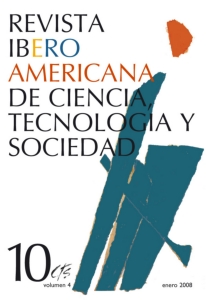Apropriação Social das Tecnologias da Informação e Comunicação
DOI:
https://doi.org/10.52712/issn.1850-0013-921Palavras-chave:
apropriação social, tecnologias da informação e comunicação, aprendizagem, alfabetização digitalResumo
Este artigo apresenta as mudanças necessárias nas modalidades de aprendizagem para uma apropriação social bem-sucedida das tecnologias da informação e comunicação (TIC). Nesse sentido, analisa-se a importância estratégica do setor educacional para o desenvolvimento de uma sociedade da informação inclusiva, que evite a exclusão social de pessoas e de grupos sociais. O autor também apresenta as linhas de ação propostas pela Cúpula Mundial da Sociedade da Informação, organizada pela ONU, com o objetivo de evitar e mitigar as desigualdades sociais geradas pela expansão global dessas tecnologias. O artigo conclui abordando a problemática linguística em torno da emergência do sistema TIC, e discute os perigos e as vantagens do surgimento de uma nova fase evolutiva no desenvolvimento dos idiomas.
Downloads
Referências
CASTELLS, M. (1996-1998): La era de la información, 3 vols., Madrid, Alianza.
ECHEVERRÍA, J. (1999): Los Señores del Aire: Telépolis y el Tercer Entorno, Barcelona, Destino.
ECHEVERRÍA, J. (2003): La revolución tecnocientífica, Madrid, FCE.
MARTÍN MUNICIO, A. (2003): El valor económico de la lengua española, Madrid, Espasa-Calpe.
PAOLILLO, J. et al. (2005): Measuring Linguistic Diversity on the Internet, París, UNESCO.
QUINTANILLA, M. A. (1989): Tecnología: un enfoque filosófico, Madrid, Fundesco.
Downloads
Publicado
Como Citar
Edição
Seção
Licença
Copyright (c) 2025 CC Attribution 4.0

Este trabalho está licenciado sob uma licença Creative Commons Attribution 4.0 International License.
Todas os números de CTS e seus artigos individuais estão sob uma licença CC-BY.
Desde 2007, a CTS proporciona acesso livre, aberto e gratuito a todos seus conteúdos, incluídos o arquivo completo da edição quadrimestral e os diversos produtos apresentados na plataforma eletrônica. Esta decisão é baseada no entendimento de que fornecer acesso livre aos materiais publicados ajuda a ter uma maior e melhor troca de conhecimentos.
Por sua vez, em se tratando da edição quadrimestral, a revista permite aos repositórios institucionais e temáticos, bem como aos sites pessoais, o autoarquivo dos artigos na versão post-print ou versão editorial, logo após da publicação da versão definitiva de cada número e sob a condição de incorporar ao autoarquivo um link direcionado à fonte original.











